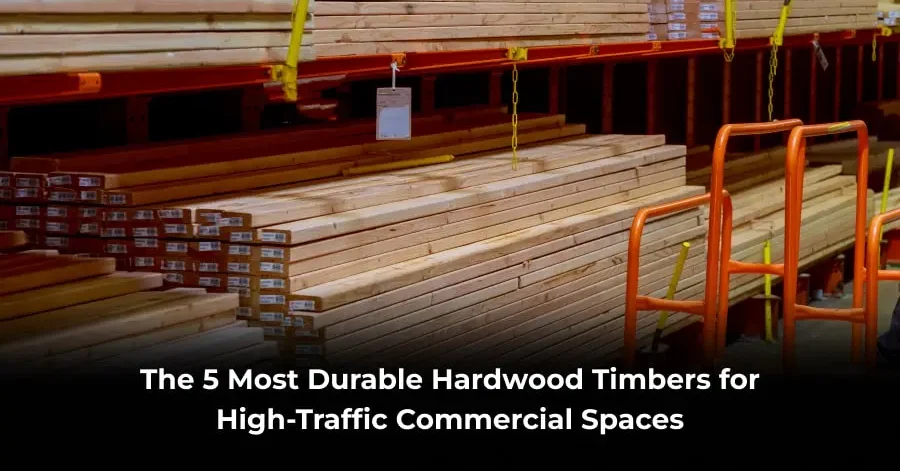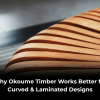Walk into a beautifully designed hotel lobby, a chic restaurant, or a prestigious office building. What’s the first thing that catches your eye? Often, it’s the warmth and grandeur of the wood underfoot or on the walls. In commercial spaces, where first impressions are everything and the daily grind is relentless, the choice of material isn’t just an aesthetic decision—it’s a strategic one.
Selecting the right hardwood timber is like choosing a long-term business partner. It needs to be resilient, reliable, and retain its character through years of heavy use. As a project manager or designer, you’re not just building for today; you’re investing for decades to come. This guide is designed to walk you through the titans of toughness in the timber world, helping you make an informed choice that balances beauty, brawn, and budget.
We’ve consulted with leading hardwood timber suppliers and scoured the archives of trusted woodworking supplies store experts to bring you this definitive list.
What Makes a Hardwood “Commercial-Grade”?
Before we dive into our top five, let’s establish the criteria. Not every beautiful wood can handle the stampede of a busy airport or the constant rearrangement of a conference room. We look for:
- Janka Hardness Rating: This is the industry standard for measuring a wood’s resistance to wear and denting. The higher the number, the tougher the timber.
- Dimensional Stability: How well does the wood resist expanding and contracting with changes in humidity and temperature? Stability is key to preventing warping and gapping.
- Natural Durability: This refers to the wood’s innate resistance to pests, rot, and fungal decay.
- Ease of Maintenance: Can it be sanded and refinished multiple times to erase the scars of time?
With these factors in mind, let’s meet the elite.
1. Hickory: The Unyielding American Workhorse
Janka Hardness: 1,820 lbf
If you’re looking for a wood that embodies sheer, unadulterated strength, Hickory is your champion. Native to North America, it’s a wood that has been used for tool handles and wagon axles for centuries—a testament to its incredible shock resistance.
Why it Works in Commercial Spaces:
Hickory’s extreme hardness makes it nearly impervious to dents and dings from dropped keys, high heels, and heavy furniture. Its grain pattern is bold and varied, often featuring striking contrasts between light sapwood and dark heartwood. This busy grain is a blessing in high-traffic areas, as it naturally camouflages minor scuffs and scratches better than a wood with a uniform appearance.
Best For: Rustic-themed restaurants, retail stores, gyms, and any space where a robust, authentic American aesthetic is desired. When sourcing from hardwood timber suppliers, ensure you select grades that match your design vision for consistency.
2. Maple: The Dense and Subtle Performer
Janka Hardness: 1,450 lbf
Don’t let Maple’s light, refined appearance fool you. This is one of the toughest players on the field. Its popularity in bowling alleys, basketball courts, and dance floors isn’t a coincidence—it’s a result of its exceptional density and wear resistance.
Why it Works in Commercial Spaces:
Maple has a fine, consistent grain that gives interiors a clean, modern, and bright feel. It takes stains exceptionally well, allowing designers to achieve a wide range of colors while still benefiting from its underlying strength. Its tight grain structure means there are fewer open pores for dirt and grime to accumulate, making it a hygienic and low-maintenance choice.
Best For: Healthcare facilities, schools, offices, and contemporary retail environments. Any reputable woodworking supplies store will stock a vast array of finishes and tools specifically suited for working with hard maple.
3. White Oak: The Timeless and Stable Classic
Janka Hardness: 1,360 lbf
White Oak is the quintessential choice for projects that demand a perfect marriage of durability, stability, and timeless beauty. Its natural resistance to moisture and decay, thanks to its tyloses-closed cellular structure, sets it apart from almost all other hardwoods.
Why it Works in Commercial Spaces:
Beyond its respectable hardness, White Oak’s legendary dimensional stability means it performs brilliantly in environments with fluctuating humidity, such as restaurants with open kitchens or lobbies near revolving doors. It is also the primary wood used in cooperage for whiskey and wine barrels, proving its resilience. Its attractive ray flake patterns and ability to take beautiful grey and weathered finishes (like lime-washing) make it endlessly versatile for both traditional and ultra-modern designs.
Best For: High-end hotels, corporate lobbies, boutique stores, and waterfront properties. It’s a staple product for quality-focused hardwood timber suppliers.
4. Jarrah: The Rugged and Rich Australian Icon
Janka Hardness: 1,910 lbf
Hailing from the forests of Western Australia, Jarrah is a dense and stunning hardwood that boasts a rich, deep red colour which matures into a distinctive, reddish-brown patina over time. With a Janka rating even higher than Hickory, it’s built to withstand the most punishing foot traffic.
Why it Works in Commercial Spaces:
Jarrah is not only hard but also boasts outstanding natural resistance to fire, termites, and rot. This makes it a superb choice for both indoor and covered outdoor commercial applications. Its rich, earthy colour adds instant warmth and luxury to a space. While it can be more challenging to work with due to its density, the results are breathtaking and long-lasting.
Best For: Luxury resorts, high-traffic public buildings, museum flooring, and exclusive retail spaces where a unique, opulent look is required.
5. Okoume Wood: The Surprising Contender for Millwork & Accents
Janka Hardness: 400 lbf
Now, you might be looking at that Janka rating and thinking, “This doesn’t belong on a durability list!” And for flooring, you’d be right. But commercial spaces aren’t just about floors. This is where Okoume wood shines in a different light.
Why it Works in Commercial Spaces:
Okoume wood, often known as Gaboon, is not chosen for its hardness but for its exceptional stability and workability. It is a premier choice for interior paneling, cabinetry, and decorative elements. Sourced from sustainable forests, Okoume wood is lightweight, has a very straight grain, and sands to a silky-smooth finish, making it a dream for custom millwork. It is less prone to warping than many heavier hardwoods, which is crucial for large panels and doors. While you wouldn’t use Okoume wood for a bar top, you might use it for the beautiful, stable panels that form the walls of the bar. You’ll find quality Okoume wood plywood at any specialist woodworking supplies store.
Best For: Feature walls, custom cabinetry, ceiling linings, and other interior architectural elements where stability and a fine finish are more critical than surface hardness.
Your Project Partners: From Supplier to Store
Choosing the right species is only half the battle. The next step is finding the right partners to bring your vision to life. This journey typically involves two key players:
- Hardwood Timber Suppliers: These are your source for the raw, beautiful material. A great supplier doesn’t just sell wood; they provide expertise. They can advise on grain matching, grade selection, and the optimal cut for your project. They are the gatekeepers to quality.
- Woodworking Supplies Store: This is the arsenal for your fabricators and installers. From specialized sandpapers and durable finishes to the tools needed for precise cutting and installation, a well-stocked woodworking supplies store is essential for ensuring the timber is treated with the care and skill it deserves from workshop to final installation.
AEW Wood: Your Trusted Partner in Premium Timber
When searching for reliable hardwood timber suppliers, it’s crucial to find a company that aligns with your values of quality, sustainability, and service. This is where AEW Wood stands out.
AEW Wood has built a reputation as a leading provider of exquisite and durable hardwoods for commercial and residential projects. They understand that selecting timber is a significant decision, and their team of experts is dedicated to guiding you through the process. Whether you’ve decided on the rugged strength of Jarrah, the timeless appeal of White Oak, or need guidance on the best application for Okoume wood, AEW Wood provides not just the product, but the partnership you need. They are committed to sourcing sustainable timber, ensuring your beautiful project is also a responsible one. For your next high-traffic commercial space, consider AEW Wood as your single source for trusted advice and superior material.
Also Read- Top Benefits of Okoume Wood for Marine and Outdoor Projects
Conclusion
Selecting the perfect hardwood for a high-traffic commercial space is a profound decision that impacts not only the immediate aesthetic but the long-term functionality and maintenance budget of the property. From the unyielding strength of Hickory and Maple to the timeless stability of White Oak, the rugged luxury of Jarrah, and the specialized role of Okoume wood for millwork, each timber offers a unique set of properties.
By understanding these characteristics and partnering with knowledgeable hardwood timber suppliers like AEW Wood and skilled craftsmen who have access to a professional woodworking supplies store, you can ensure that your commercial space doesn’t just look stunning on opening day, but continues to tell a story of quality and resilience for many years to come. Invest in the right wood, and watch it become a silent, enduring testament to your good judgment.
Frequently Asked Questions (FAQs)
Q1: Can I use a softer wood like Okoume wood in a commercial setting?
Absolutely. While you wouldn’t use Okoume wood for flooring in a high-traffic area, its exceptional stability makes it an excellent choice for interior architectural elements like wall paneling, cabinetry, and decorative features where durability against impact is less critical than resistance to warping.
Q2: How do I find reputable hardwood timber suppliers?
Look for suppliers with strong industry reputations, clear documentation on the source and species of their wood, and a willingness to provide samples and references. Companies like AEW Wood are excellent examples of suppliers who offer both product and expertise.
Q3: Beyond hardness, what is the most important factor for commercial flooring?
Dimensional stability is arguably just as important. A stable wood like White Oak will resist seasonal expansion and contraction, preventing gaps, cupping, or buckling, which can compromise the floor’s integrity and appearance over time.
Q4: What finishes are best for protecting hardwood in commercial spaces?
Commercial-grade UV-cured urethanes or industrial-grade oil finishes are top choices. They offer superior resistance to abrasion, chemicals, and UV radiation. The experts at your local woodworking supplies store can recommend the best system for your chosen wood species.
Q5: I have a limited budget but want a durable wood. What do you recommend?
Hickory and Maple often provide the best balance of extreme durability and relative cost-effectiveness compared to more exotic imports. Discuss your budget with your hardwood timber suppliers—they can often suggest lower-grade options with character marks that add aesthetic appeal while reducing cost.






